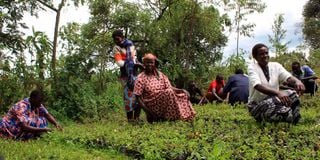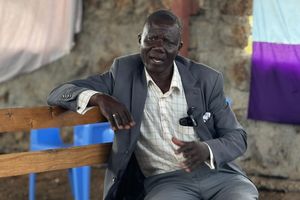Women leading the restoration of River Yala ecosystem

What you need to know:
- Chepchirchir Bett, a member and patron of Chemakaltet women's group, says she has worked tirelessly for a year to restore degraded land in the River Yala ecosystem.
- The restoration project involves planting indigenous trees in water catchment areas, wetlands, and farmlands.
Kapchumba area in Emgwen, Nandi County, is a beehive of activity as a group of women diligently tend to hundreds of neatly packed young seedlings in a tree nursery. The seedlings of various tree species are being carefully prepared for planting in the area to combat the negative impacts of climate change.
The women are dedicated to ensuring that the young plants receive the best care possible so they can grow to be mature, healthy trees. Chepchirchir Bett, a member and patron of Chemakaltet women's group, says she has worked tirelessly for a year to restore degraded land in the River Yala ecosystem.
The restoration project involves planting indigenous trees in water catchment areas, wetlands, and farmlands. “The motivation for undertaking this project is to combat the adverse effects of unpredictable rainfall, water scarcity during dry seasons and the heavy siltation of rivers during the rainy season,” she notes.
Chepchirchir's efforts are a testament to her unwavering commitment to preserving the environment and promoting sustainable living. “We realised that women suffer most due to climate change. Several streams usually dry up during the dry spell and women are forced to travel long distances in search of water,” states Ms Bett.
To restore degraded farmlands, the women have taken it upon themselves to cultivate an array of indigenous tree species that are suitable for the local environment. They have grown more than 200,000 seedlings of various species such as croton, red stinkwood and Elgon teak.
They say the target is to increase the number of seedlings by 10 times before the end of next year. These seedlings are sold to community members and other conservation organisations. The move not only raises awareness about the importance of planting trees but also provides an economic boost to the group.
Chepchirchir notes that each seedling is priced between Sh50 and Sh100, which is a reasonable price for a product that has a significant impact on the environment. Elizabeth Biwott, a member of the group, says the project’s goal is to restore degraded lands and improve livelihoods.
She notes that rains have become more erratic, negatively impacting food and fodder production for their livestock. “Our rivers are drying up and we are losing rare wildlife like statunga that used to roam here. But since we started planting trees, our rivers are flowing again,” says Ms Biwott.
Brian Kipngetich, an environment officer, says the county forest cover stands at 22 per cent, adding that they are working to increase it to over 30 per cent within the next 10 years. He says they have started several initiatives to improve the forest cover, highlighting that they have planted 200,000 seedlings in the first phase and hope to plant over two million seedlings within the next two years.
"We realised there was a reduction in water volumes in River Yala and residents downstream were also not getting clean water due to contamination in the river and siltation. This initiative will go a long way in protecting this critical water system," says the officer.
Stephen Kibet, the resilience watershed manager at The Nature Conservancy, states that the pioneer River Yala water fund project seeks to rehabilitate the water systems and enable residents living on the banks of the river in Nandi, Vihiga, Kakamega and Siaya counties to access clean water. “It also seeks to protect water catchment areas.”
He says they target to plant over one million indigenous trees and high-value crops such as avocado and macadamia in the ecosystem to protect the wetlands, address heavy siltation and increase water volumes.
“Farmers in the county engage in unsustainable farming practices like farming closer to the river banks; and thus we are experiencing a lot of siltation in the rivers and reduced water volumes during the dry season,” he states. The project involves residents, devolved units and other partners such as The Nature Conservancy and International Crane Foundation.
The goal is to conserve wetlands and water catchment areas such as Kimondi Forest and Kinywal swamp and protect endangered sitatungas and crane birds. Kibet discloses that they are working with 50 women groups, including Chemakaltet, to rehabilitate the degraded ecosystem, noting that the degradation is due to human actions.
He says local women are involved in sustainable agriculture practices such as terracing, tree planting drives as well as provision of energy-saving jikos. “Women are at the heart of the project because they bear the brunt of most climate change effects. This is a pioneer project in the world where women are actively involved in environmental projects,” states Kibet.





